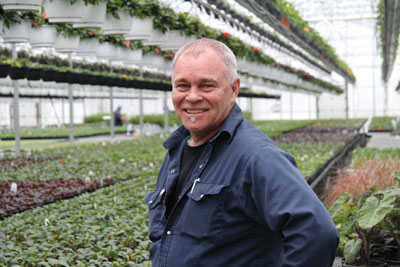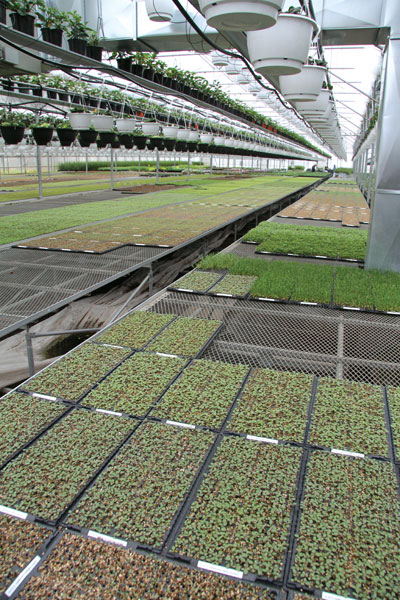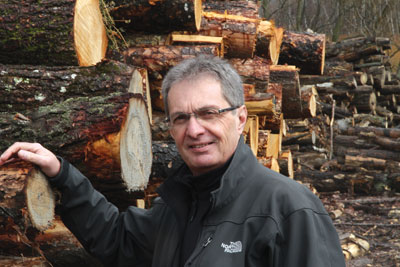
Checking on newly seeded plants, watering cuttings, taking phone calls from clients, coordinating the work of employees …
Checking on newly seeded plants, watering cuttings, taking phone calls from clients, coordinating the work of employees … when it’s peak season, Claude Riel is everywhere at once, except in his office.
 |
|
| Claude Riel, this year’s Méritas Gilles-Bordeleau winner. PHOTOS BY ANDRé DUMONT Advertisement
|
At 60 years of age, Riel remains an energetic and upbeat grower, despite the tough times his business and the industry are going through. He oversees the production of annuals in his 60-some greenhouses with a passion, saving some of the most delicate grower tasks for himself.
“I’m not the type of guy to sit behind his computer,” he says. “I like to be out there in the greenhouses, watering our flower baskets or talking to our workers.”
Riel was honoured this year by his peers within the Syndicat des producteurs en serre du Québec (greenhouse growers’ union). He was awarded the 2012 Méritas Gilles-Bordeleau for his extensive volunteer work with the association and other grower groups.
He was praised for “his perseverance, his relentless work and his vision of horticulture in Quebec.”
GRADUATE OF THE INSTITUT DE TECHNOLOGIE AGROALIMENTAIRE
■ Riel studied horticulture at the Institut de technologie agroalimentaire in Saint-Hyacinthe. In 1971, he purchased his father’s farm along with its five or six greenhouses, near Saint-Rémi, south of Montreal.
 |
|
| Welcome to Les Serres Riel
|
Vegetable production was immediately abandoned, in order to focus on annual flowers.
The ’70s and ’80s were good years, Riel remembers. “Every year, we would be short on annuals. We made money, we would build a greenhouse or two and the following year, all our production would sell.”
The recession years of 1982-83 were particularly busy for them. “People stayed at home. They bought flowers, because they were inexpensive and they could plant a lot,” Riel recalls.
BEAUTIFICATION PROGRAM HELPs GROW PLANT SALES
■ Another major boost came from Villes et villages fleuris, a program and contest that encouraged municipalities to spruce up their streets. Spearheaded by then provincial agriculture minister Jean Garon, the program was a huge success. Everyone in the industry remembers it very well.
Unfortunately, the current trend goes in a totally opposite direction. “Municipalities are putting in more grass, trees and perennials and a lot less annuals,” Riel notes. “Some municipal councils prefer to invest in concrete. Using annuals is seen as something that requires a lot of maintenance.”
Riel gets most upset when he notices outdoor locations making extensive use of plastic flowers, including a nearby major shopping complex. “The same plastic flowers in baskets have been out there for two years. They are not very pretty anymore.”
OVERPRODUCTION BECOMING AN ISSUE
■ The biggest blow growers have received in the past five years has been the Canadian dollar growing stronger, to the point where exports to the U.S. have shrunk to historically low levels. “Quebec and Ontario growers used to export a lot more,” Riel says. “Now we are suffering from overproduction and Ontario growers are shipping their flowers to Quebec.”
 |
|
| Les Serres Riel is constantly expanding its product line.
|
Competition among growers and against cheaper U.S. imports is driving down prices. According to Riel, several growers have gone out of business and others are about to follow.
“We are going through tough, very tough years,” he says. Input costs are rising and Les Serres Riel was lucky to be able to secure natural gas at a low price for the upcoming years.
Quebec growers have made several attempts at better controlling the supply of flowers and in promoting them through marketing campaigns. Each time, Riel was on board as a strong advocate of collective action.
Every time, however, projects failed within a year or two, when participating growers realized that non-participating growers were reaping the same benefits without paying their share.
What is needed is a major change in consumer mentalities, Riel says. Gardening and the use of annuals should be promoted as an environmentally friendly way to spruce up surroundings and as a family activity that can be just as enjoyable as cycling or camping.
“When we pooled together to promote annuals with generic advertisements, at least we were able to maintain sales. Since then, sales have been going down and growers don’t seem to realize what’s happening.”
COMPANY REMAINS A MAJOR PRODUCER OF PLANTS
■ Les Serres Riel remains among Quebec’s largest producers of annuals, thanks to its solid relationships with garden centres, municipalities and its clientele at Atwater Market in Montreal.
Riel’s wife Monique has retired, but the business can now count on their daughter Marie-Andrée, who has become a shareholder. She handles administration and human resources.
Les Serres Riel also relies on a team of foreign workers, most of them from Mexico and Guatemala.
“If one day someone decides we can’t have foreign workers anymore, it will be the end,” Riel says. “Otherwise, it’s impossible to have a stable work force.”
In the past, the Riels’ have been involved on a volunteer basis with FERME, the Quebec farmer association that handles all procedures for seasonal agriculture workers from abroad.
The company is constantly expanding its product lineup, in order to provide gardeners with quality plants that differ in shape and size from what can be purchased in large retail stores.
Les Serres Riel is in direct contact with amateur and professional gardeners at their two stands at the Atwater Market. The market is advantageously located at the foot of Westmount, one of Canada’s most affluent communities.
Business may be tough, but Riel has lost none of his enthusiasm.
“It’s a constant challenge,” he says. “You work with living material. When you succeed and you achieve high quality, it’s highly motivating.”
Biomass believer honoured for innovative projects
VegQuebec greenhouse growers have also honoured forestry engineer Jean Gobeil for his dedication in implementing biomass heating technology on greenhouse operations. Gobeil was awarded the Méritas Rolland-Harnois for “showing faith in the development of (local) greenhouse production and believing in the potential of our businesses and their work force.” He is the mastermind behind the biomass conversion at Serres Lefort, one of Quebec’s largest propagators. His expertise and leadership are also behind the Vitrine biomasse, a project that involved converting tomato grower Luc Verrier’s greenhouse complex to biomass heating. Initiated by the Syndicat des producteurs en serre du Québec, this project is to act as a showcase and information source for biomass heating technology. GROWING YOUR OWN FUEL ONSITE “For most growers around here, biomass heating is what will save them. Apart from natural gas, all other forms of energy have become too expensive,” Gobeil told Greenhouse Canada. Gobeil has travelled several times to Europe to gather new ideas and to scout for the best technology. He was also praised for his leadership skills, being someone who brings people together, values teamwork, and likes to work with employees of all ages. As a consultant, he is currently working on at least four projects. “Not a week goes by without a new request coming in,” he says. |
André Dumont is a freelance writer and photographer in Quebec.
Print this page
